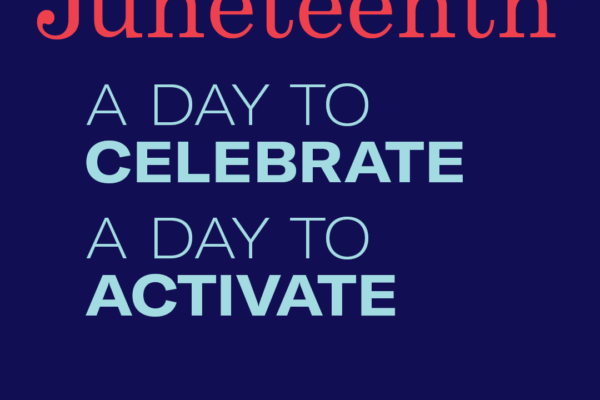"They existed. They existed. We can be. Be and be better. For they existed." – Maya Angelou
On January 1, 1863, President Lincoln signed the Emancipation Proclamation, declaring freedom for "all persons held as slaves" within the rebellious states of the Civil War. Over two years later, on June 19, 1865, enslaved Black Americans in Texas learned of their freedom. Juneteenth commemorates that long-delayed arrival of freedom. Until that day, they continued to labor under brutal, dehumanizing conditions while clinging to the hope that freedom might one day reach them. Relentless perseverance supported enslaved and formerly enslaved people each day on their journey to freedom.
We must rely on that same perseverance today as we collectively work toward liberation. Today, 160 years later, many Black communities are still waiting for the full promise of liberty with complete expression of their civil rights. In America, the reverberations of enslavement continue to manifest in policies designed to deprive us of self-determination in an attempt to deny a future that Black Americans have been owed for generations.
On May 29, 2025, the Trump Administration implemented one such policy, ordering the shutdown of Job Corps Centers nationwide. Job Corps provides free career training, housing, and meals to underserved youth. For many communities, especially those that are low-income or marginalized, Job Corps is a lifeline and a promise of a better life. The decision to end it was a targeted attack on the futures of youth facing difficult barriers to stability and success.
For me, this decision felt personal. One of the Job Corps Centers is located at 1000 Curtis Price Way in Charleston, West Virginia, a road named after my maternal grandfather, Dada Curt, who dedicated much of his life to Job Corps with the belief that youth deserve dignity and access to opportunity, regardless of their inherited foundation.
Dada Curt had the privilege of working with Job Corps students because he inherited a strong foundation from my ancestors, built by generations of sacrifice and service. My ancestors held onto joy and hopes of freedom through holding onto each other, singing, and dancing, while trusting that one day their descendants would be able to freely and safely sing, dance, read, write, and thrive.
I am one of those descendants. My great-grandmother was a church leader. My grandfather earned his college degree. My mother earned her Ph.D. I earned my Juris Doctor degree. But before we achieved those milestones, our ancestors risked everything just to survive. Juneteenth reminds us of that legacy and that the legacies of hard work and survival are under threat. But it also reminds us that we carry forward generations of resilience, joy, and hope each day.
The ACLU has protected democracy and freedom for over 100 years with the knowledge that no one is free until all of us are free. As you join us on our mission to achieve collective freedom during this iteration of attacks, remember this:
- We do this work in hopes of laying a strong foundation for future generations to live more peaceful, freer, fuller lives than we can even imagine.
- Because our ancestors endured, we have the privilege and the responsibility to continue their work to ensure this country becomes the place they dreamed it could be.
Join us in learning more about the history and meaning of Juneteenth by visiting Racial Justice on our website. Show your solidarity by participating in Juneteenth events across Montana.
Ashlee Rossler
Pronouns: She, her, hers
Civil Rights Staff Attorney, ACLU of Montana

